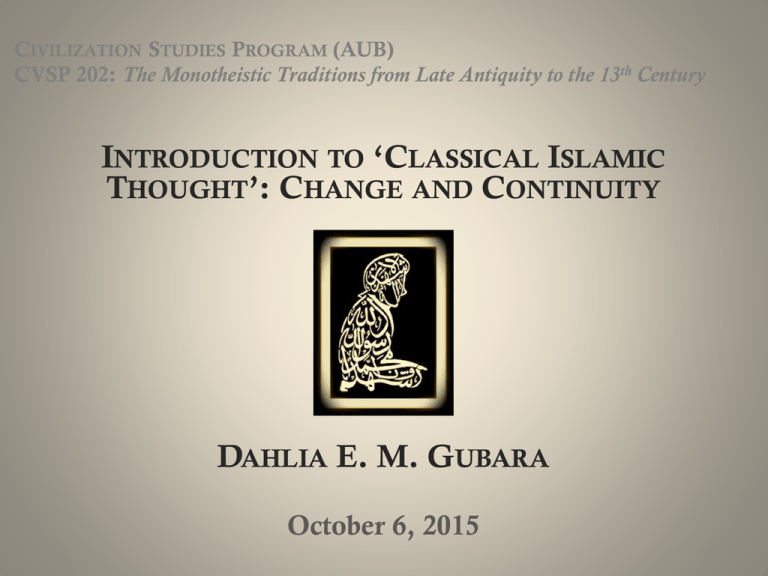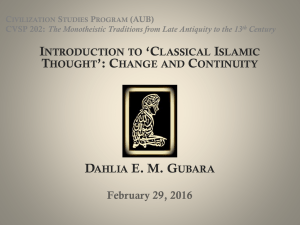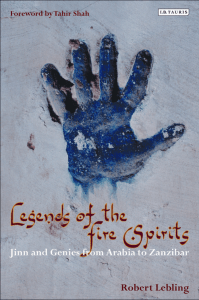I ‘C T ’: C
advertisement

CIVILIZATION STUDIES PROGRAM (AUB) CVSP 202: The Monotheistic Traditions from Late Antiquity to the 13th Century INTRODUCTION TO ‘CLASSICAL ISLAMIC THOUGHT’: CHANGE AND CONTINUITY DAHLIA E. M. GUBARA October 6, 2015 I. INTRODUCTION: What does the past mean to us today? What is ‘CLASSICAL’ - What is ‘ISLAMIC’ What is ‘THOUGHT’? II. LATE ANTIQUITY, ISLAM AS A TRADITION Two conventional theories on the formation of Islam: ‘Out of Arabia’ and/or the Late Antique Near East More than an epoch: Late Antiquity as a ‘shared epistemic space’ (a space of knowledge-making) Balancing the old and the new: Revelation and Prophecy as the linchpin of tradition Expansion of the Islamic State Ikhwān al-Ṣafāʾ wa Khullān al-Wafāʾ wa Ahl al-Hamd wa Abnāʾ al-Majd (the Brethren of Purity, the Loyal Friends, People of Praise, and Sons of Glory) Al-Ghazālī’s Wanderings The Harūniyya, (Seljuk-Ilkhanid mausoleum in Tus, near Mashhad, Iran) where al-Ghazālī is said to be buried (http://archnet.org/sites/3885/media_contents/62839) III. COMMON NARRATIVES, CONTEXTUAL MATTERS: Our authors, their times, their works, and their reception Ikhwān al-Ṣafāʾ Anonymous collective – esoteric fraternity Possibly active in the last quarter of the 10th century A.D. in Basra and Baghdad Abū Ḥāmid Muḥammad ibn Muḥammad al-Ghazālī Renowned figure of ‘mainstream Islam’ Born 1058 near Tus, northeastern Iran Died in 1111 A.D. Sunni, Ash’ari, Shafi’i, and close to Political, sectarian and creedal affiliation Seljuk vizir Nizam al-Mulk and the unknown Abbasid court Prolific corpus spanning many Other works unknown disciplines (jurisprudence, theology, philosophy and Sufism) Rasāʾil – encyclopedic, classification of Munqidh - Intellectual, autobiographical knowledge Critical of falsafa, reconciles legal Philosophically neo-Platonist and ecumenical in spirit orthodoxy with Sufi mysticism Ikhwān al-Ṣafāʾ, Epistle 22: The Case of the Animals vs. Man before the King of the Jinn (online source) Ikhwān al-Ṣafāʾ: Epistle 22: The Case of the Animals vs. Man before the King of the Jinn: Al-Ghazālī, Al-munqidh min al-ḍalāl: The Trial: disputation, debate, proof and the methods of reasoning Diving into the Profound Sea of Knowledge Cosmological doctrines (Creation and Creator) Severing the Fetters of Servile Conformism Mediation on power and justice (mastery/bondage; tyranny/mercy; truth/falsehood-ignorance) Deducing the True Meaning of Things Ethical-spiritual ecology (ayāt Allah, earth as a Trust) The Primordial Covenant, Prophecy and the Question of tawātur Knowledge as Ḥikmah The Ḥakīm’s antidote (sickness of the heart) The fable as a form (universal truth, the speech of the powerful vs. the powerless) IV. LEVELS OF INTERPRETATION: • Epistemic certainty: Integrated Methods, Modes of Reasoning • The Ends of Knowledge: Social: pedagogy, instruction, initiation, social and political order Individual: happiness, salvation (soteriology the final return to God, yawm al-ḥisāb) V.FINAL CONSIDERATIONS: Reason vs. Revelation? (al-manqūl and alma’qūl) Syncretism and Reconciliation Philosophy vs. Religion? Postscript – ‘Polymathesis,’ Education, Edification the ‘CVSP Man’




